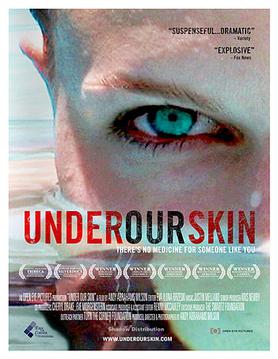Under Our Skin
Under Our Skin is a documentary film that investigates the untold story of Lyme disease, a growing epidemic that is often misunderstood and misdiagnosed. Directed by Andy Abrahams Wilson, the film delves into the lives of those affected by Lyme disease, as well as the controversies surrounding its diagnosis, treatment, and recognition by the medical establishment.
Synopsis[edit | edit source]
Under Our Skin brings to light the struggles of patients who suffer from Lyme disease, a tick-borne illness that can lead to severe neurological and physical symptoms if not treated early. The film exposes the challenges faced by patients in getting a proper diagnosis, often due to the limitations of current testing methods and the lack of consensus among healthcare professionals about the disease's long-term effects and treatment protocols. Through personal stories, the documentary highlights the emotional, physical, and financial toll on individuals and families as they navigate a contentious and confusing healthcare landscape.
Controversies[edit | edit source]
One of the central themes of Under Our Skin is the controversy within the medical community regarding Lyme disease. The film discusses the divide between two camps: those who follow the Infectious Diseases Society of America (IDSA) guidelines, which suggest that Lyme disease is easily diagnosed and treated with a short course of antibiotics, and those who support the International Lyme and Associated Diseases Society (ILADS) guidelines, which recognize chronic Lyme disease and recommend longer-term treatment. This division has led to significant debate over treatment approaches, insurance coverage, and the recognition of chronic Lyme disease as a legitimate condition.
Impact[edit | edit source]
Since its release, Under Our Skin has had a significant impact on raising awareness about Lyme disease. It has been screened at numerous film festivals, healthcare institutions, and community events, sparking discussions about the need for better research, improved diagnostic methods, and more effective treatments for Lyme disease. The film has also contributed to legislative efforts in some states to protect doctors who treat Lyme disease according to the ILADS guidelines and to require insurance companies to cover long-term treatment.
Reception[edit | edit source]
Under Our Skin has received critical acclaim for its thorough investigation and compelling storytelling. It has been praised for shedding light on a complex and often overlooked issue, providing a voice to those who have been marginalized by the healthcare system. However, some critics argue that the film is biased towards the perspective of chronic Lyme disease advocates and does not adequately represent the views of the broader medical community.
Conclusion[edit | edit source]
Under Our Skin is a powerful documentary that explores the complexities of Lyme disease, from the personal struggles of those affected to the broader controversies in the medical community. It serves as a call to action for more research, better treatment options, and greater understanding and recognition of Lyme disease as a serious and growing public health issue.
Search WikiMD
Ad.Tired of being Overweight? Try W8MD's NYC physician weight loss.
Semaglutide (Ozempic / Wegovy and Tirzepatide (Mounjaro / Zepbound) available. Call 718 946 5500.
Advertise on WikiMD
|
WikiMD's Wellness Encyclopedia |
| Let Food Be Thy Medicine Medicine Thy Food - Hippocrates |
Translate this page: - East Asian
中文,
日本,
한국어,
South Asian
हिन्दी,
தமிழ்,
తెలుగు,
Urdu,
ಕನ್ನಡ,
Southeast Asian
Indonesian,
Vietnamese,
Thai,
မြန်မာဘာသာ,
বাংলা
European
español,
Deutsch,
français,
Greek,
português do Brasil,
polski,
română,
русский,
Nederlands,
norsk,
svenska,
suomi,
Italian
Middle Eastern & African
عربى,
Turkish,
Persian,
Hebrew,
Afrikaans,
isiZulu,
Kiswahili,
Other
Bulgarian,
Hungarian,
Czech,
Swedish,
മലയാളം,
मराठी,
ਪੰਜਾਬੀ,
ગુજરાતી,
Portuguese,
Ukrainian
Medical Disclaimer: WikiMD is not a substitute for professional medical advice. The information on WikiMD is provided as an information resource only, may be incorrect, outdated or misleading, and is not to be used or relied on for any diagnostic or treatment purposes. Please consult your health care provider before making any healthcare decisions or for guidance about a specific medical condition. WikiMD expressly disclaims responsibility, and shall have no liability, for any damages, loss, injury, or liability whatsoever suffered as a result of your reliance on the information contained in this site. By visiting this site you agree to the foregoing terms and conditions, which may from time to time be changed or supplemented by WikiMD. If you do not agree to the foregoing terms and conditions, you should not enter or use this site. See full disclaimer.
Credits:Most images are courtesy of Wikimedia commons, and templates, categories Wikipedia, licensed under CC BY SA or similar.
Contributors: Prab R. Tumpati, MD

